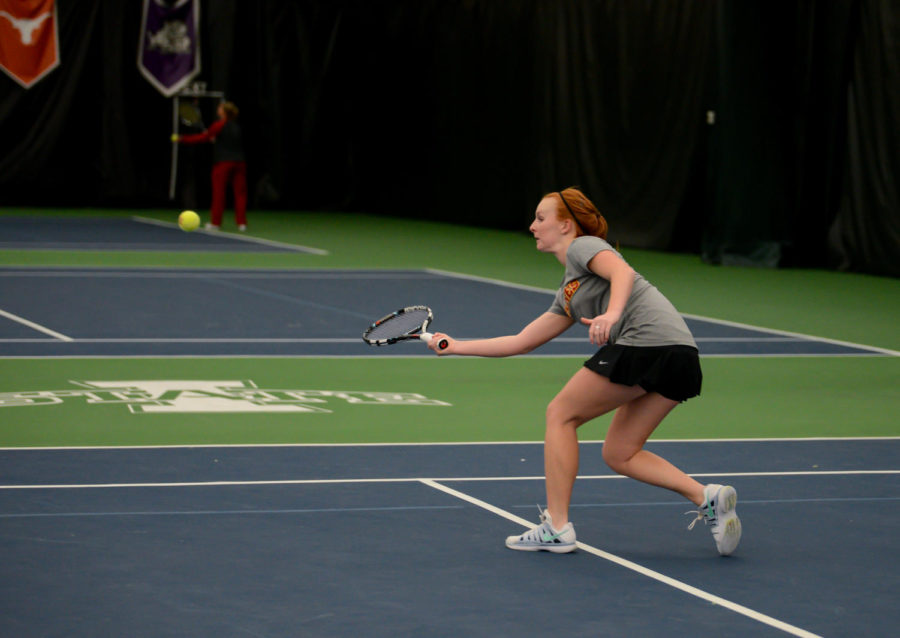Iowa State tennis performs well under experimental format
Junior Meghan Cassens hustles to the ball during Iowa State’s 7-0 defeat of North Dakota on Jan. 31 at Ames Racquet and Fitness Center.
February 3, 2014
The ISU tennis team is still undefeated at home, after claiming their third consecutive win by way of a 7-0 sweep of North Dakota on Jan. 31.
The seven match victories brought the Cyclones’ overall tally to 20-0 for the young season, but perfection doesn’t mean that Iowa State has moved through its first three home meets unscathed.
Freshman Samantha Budai, junior Meghan Cassens, and freshman Lydia Green all lost the opening set of their singles matches against North Dakota, after the Cyclones swept doubles to take an early 1-0 lead.
Cassens admitted that her expectations coming into the match may have played a role in her opening set predicament.
“I started to get frustrated because I’d beaten her in the fall,” Cassens said. “I was expecting a little different outcome in the first set.”
For Green, the issue was less about preconceived notions, and more about focus after sitting out the doubles contests.
“It didn’t help that I didn’t get to play doubles,” Green said. “With the new format, I don’t get a warm up before my match, so i was sitting around cheering, then immediately had to play. Mentally, I wasn’t quite prepared at the beginning.”
Matches are determined by a three set system, but the NCAA is testing a new super tiebreak format in an effort to shorten matches and make them more viable for television broadcast, said ISU coach Armando Espinosa.
Normal tiebreaks take place after the players reach a 6-6 tie in a set. The tiebreak is simply a race to seven points, the winner taking the set, 7-6.
A super tiebreak is a race to ten points, not seven, and is utilized as a speedy substitute for the entire third set itself.
“If you’ve lost the first set, [a super tiebreak] can be really motivating because it is such an equalizer in the match,” Green said. “But, if you won the first set and start going down in the second, it is very scary. A super tiebreak is a complete lottery.”
Espinosa said the super tiebreak is a format that generally favors the underdog because if a player can win one of the first two sets, then the match essentially becomes a toss-up.
“This is the first year, and it’s one of those initiatives we just have to test,” Espinosa said. “It will be done for the next two weeks in February, then we’ll go back.”
Iowa State thrived under the pressure of the experimental format, winning all three super tiebreaks and clinching the meet 7-0 over North Dakota.
“We responded pretty well,” Espinosa said. “It could have easily been a 4-3 win for us, or potentially even a loss.”
Iowa State hits the road next week for its first of four consecutive weekends away from home, traveling to Milwaukee to face off against Marquette at 4:00 p.m. on Feb. 7.
The Cyclones will give an encore performance the following day, matching up with Wisconsin–Milwaukee at 12:30 p.m. Feb. 8.







